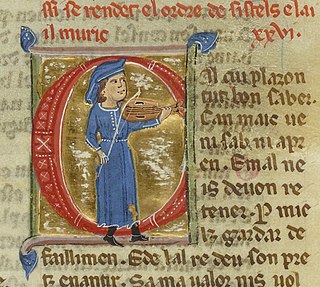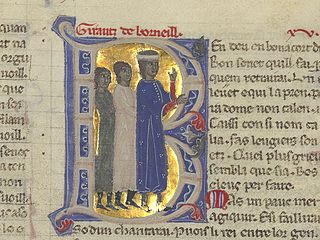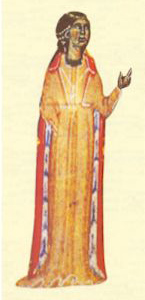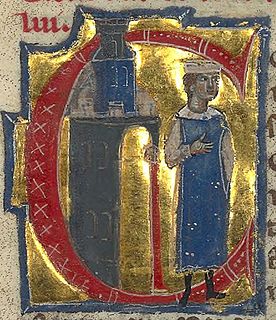
A troubadour was a composer and performer of Old Occitan lyric poetry during the High Middle Ages (1100–1350). Since the word troubadour is etymologically masculine, a female troubadour is usually called a trobairitz.

Arnaut Daniel was an Occitan troubadour of the 12th century, praised by Dante as "the best smith" and called a "grand master of love" by Petrarch. In the 20th century he was lauded by Ezra Pound in The Spirit of Romance (1910) as the greatest poet to have ever lived.
Occitan literature is a body of texts written in Occitan, mostly in the south of France. It was the first literature in a Romance language and inspired the rise of vernacular literature throughout medieval Europe. Occitan literature's Golden Age was in the 12th century, when a rich and complex body of lyrical poetry was produced by troubadours writing in Old Occitan, which still survives to this day. Although Catalan is considered by some a variety of Occitan, this article will not deal with Catalan literature, which started diverging from its Southern French counterpart in the late 13th century.

Guiraut Riquier de Narbona is among the last of the Occitan troubadours. He is well known because of his great care in writing out his works and keeping them together—the New Grove Encyclopedia considers him an "anthologist" of his own works.

Giraut de Bornelh, whose first name is also spelled Guiraut and whose toponym as de Borneil or de Borneyll, was a troubadour connected to the castle of the viscount of Limoges. He is credited with the formalisation, if not the invention, of the "light" style, or trobar leu.

Peire Cardenal was a troubadour known for his satirical sirventes and his dislike of the clergy. Ninety-six pieces of his remain, a number rarely matched by other poets of the age.

Azalais de Porcairagues or Alasais de Porcaragues was a trobairitz, composing in Occitan in the late 12th century.

The trobairitz were Occitan female troubadours of the 12th and 13th centuries, active from around 1170 to approximately 1260. Trobairitz is both singular and plural.
A tenso is a style of troubadour song. It takes the form of a debate in which each voice defends a position; common topics relate to love or ethics. Usually, the tenso is written by two different poets, but several examples exist in which one of the parties is imaginary, including God, the poet's horse or his cloak. Closely related, and sometimes overlapping, genres include:

Guilhem de Saint-Leidier, also spelled Guilhem de Saint Deslier, Guillem de Saint Deidier and Guilhèm de Sant Leidier was a troubadour of the 12th century, composing in Occitan. He was lord of Saint Didier-en-Velay, was born at some date before 1150, and died between 1195 and 1200. He was said to have loved Belissende, sister of Dalfi d'Alvernha and wife of Eracle III of Polignac, Guilhem's feudal overlord.
A cobla esparsa in Old Occitan is the name used for a single-stanza poem in troubadour poetry. They constitute about 15% of the troubadour output, and they are the dominant form among late authors like Bertran Carbonel and Guillem de l'Olivier. The term cobla triada is used by modern scholars to indicate a cobla taken from a longer poem and let stand on its own, but its original medieval meaning was a cobla esparsa taken from a larger collection of such poems, since coblas esparsas were usually presented in large groupings.
En Johan Esteve de Bezers, in modern orthography Joan Esteve, was a troubadour from Béziers. The only chansonnier which contains his eleven works, also calls him Olier de Bezers, implying that he was perhaps a potter. All his works are accompanied by dates of composition which allows scholars to place his literary output between 1270 and 1288.
Henry II, of the House of Millau, was the Count of Rodez and Viscount of Carlat from 1274 until his death. He was the son of Hugh IV of Rodez and Isabeau de Roquefeuil.
Jaufre de Pons or Pon was a 13th-century knight and troubadour from the castle of Pons in the March of Poitou in the Saintonge. He composed tensos with his castellan, Rainaut de Pons. There is joint vida of Jaufre and Rainaut. Only two of his tensos survive and only one that has survived is with Rainaut. The other is a partimen with Guiraut Riquier. Jaufre's part in the debate consists in asking plain youthful questions about love only to receive the bitter and experienced answers of Guiraut in proverbial form.

Uc de la Bacalaria was a Limousin troubadour from La Bachellerie near Uzerche, the home town of Gaucelm Faidit. According to his vida, he was a jongleur who travelled infrequently and was hardly known. He composed cansos, tensos, one alba, and one descort. Six songs are surviving: one canso, one alba, and four tensos. According to the vida, he was courtly, capable, and learned.

A torneyamen or certamen was a lyric genre of the troubadours of the thirteenth century. Closely related to the tenso, a debate between two poets, and the partimen, a question posed by one poet and another's response, the torneyamen took place between several poets, originally usually three. The first three-way tenso was initiated by Raimbaut de Vaqueiras with Ademar de Peiteus and Perdigon. These wider tensos only became known as torneyamens later. A tenso or partimen that was submitted to another troubadour for adjudication may have a poetic jutjamen (judgement) attached to it and so may be considered as a torneyamen between three. The torneyamen, like the related debate forms, was probably especially common at contests, such as floral games and puys. Many such tensos and partimens come with attached jutjamens rendered in verse, as in the example Senyer Bernatz, dues puncelhas say cited below.
A salut d'amor or (e)pistola ("epistle") was an Occitan lyric poem of the troubadours, written as a letter from one lover to another in the tradition of courtly love. Some songs preserved in the Italian Quattrocento and Cinquecento chansonniers are labelled in the rubrics as saluts, but the salut is not treated as a genre by medieval Occitan grammarians. The trouvères copied the Occitan song style into Old French as the salut d'amour. There are a total of nineteen surviving Occitan saluts and twelve French ones, with a Catalan examples also.
Las, qu'i non sun sparvir, astur, which translates "Oh, to be a sparrow-hawk, a goshawk!", is the incipit of an anonymous Old Occitan cobla. It was found in the margins of an eleventh-century manuscript in the British Library. Possibly it was added late in that century, certainly by a German scribe. It was first published in 1984, and has been translated into French and English.
O Maria, Deu maire is an Old Occitan song, a hymn to the Virgin Mary, unique in being both the only song from the Saint Martial school that is entirely in the vernacular and the only medieval Occitan song with extant musical notation for all its (twelve) stanzas. It dates to the 1090s and is preserved in MS f. lat. 1139 of the Bibliothèque nationale de France. It has been translated into English.